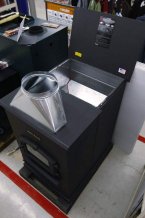|
October 30,
2009
Regulations test alternative energy

GOFFSTOWN
-
Today we have a cautionary tale about an alternative energy technology that holds great hope for New Hampshire. Alas, for the geeks in the audience, it’s cautionary, not because of fun technical issues but because of boring regulatory issues.
Our story begins three years ago, when Richard Goulet of Goffstown needed to replace his home’s heating system. Since he was tired of paying money that eventually made it to OPEC and is living in a state full of trees, he figured he’d use wood instead of oil to heat the water that heats his home.
So he bought a pellet boiler system – basically, a very large pellet stove that automatically feeds what looks like rabbit pellets to a burner that heats a boiler, the same way his previous system did with fuel oil. It cost about $3,000 more than a traditional one but has cut his fuel cost roughly in half.
“I’ve already saved the difference between a pellet boiler and oil burner, now
I’m saving money,” he said in an interview last week.
This was 2006, long before the federal government began a push for alternative fuels, before New Hampshire joined the Regional Greenhouse Gas Initiative to reduce emissions, before most state and federal incentives were created to switch us from fossil fuels like oil.
Goulet was way ahead of all those curves.
So everything is great, right? Well, not exactly.
It was great, but then he tried to refinance his home via the Federal Housing Administration.
“It gets to the FHA and they say no, you have to have a supplemental heating system that will retain the house at 50 degrees throughout the winter. That is a wood stove, and it isn’t enough,” Goulet said.
|

This pellet furnace, sold at
Tractor Supply in Merrimack,
can attach to a home’s forced
hot air ductwork and operate
alone or in conjunction with
another fuel burning source.
|
The FHA, in other words, says a wood-pellet boiler system with an automatic feeding system controlled by a thermostat and, in Goulet’s case, a hopper that can hold 250 pounds or pellets (roughly three days supply) isn’t reliable enough to ensure that his pipes won’t freeze in the winter. If he wants their low-interest loans, he’s also got to have an electric or oil- or gas-fired heating system in place, a cost that knocks pellet boilers on the head.
“When they think about wood-burning systems in the U.S., all the laws are written around a wood stove that has to be stoked every four hours, and not an automatically fed pellet system,” said John Strimling, president and CEO of
Woodpellets.com of Goffstown, which sells the pellets online. “The systems have matured since the laws and regulations were written, but the paperwork hasn’t kept up.”
The industry is looking into it, says Seth Voyles of the Pellet Fuels Institute, an industry lobbying group on the outskirts of Washington, D.C.
Officials are talking with congressional offices about getting a law passed to change FHA regulations, but the wheels of the federal government grind slowly.
“These kind of things take an awful lot of time to change,” said Voyles.
This FHA financing obstacle is ironic because replacing fossil fuels with wood is a big part of the alternative-energy push here in heavily wooded Northern New England. Not only would that be better for our long-term carbon footprint, it provides income and jobs at places like New England Wood Pellet in Jaffrey, which is better than providing them at an oil field in Saudi Arabia.
Pellet stoves are a fast-growing part of the wood-heat industry – sorry, I mean “thermal biomass industry.” They are much easier to use than traditional wood stoves because the uniform size of pellets allows automated feed, generally by an auger leading from a big hopper full of pellets.
By contrast, it’s almost impossible to automate a supply of traditional firewood into a burner, due to the variety of sizes and shapes, so you’ve got to fill the firebox manually.
There are two drawbacks: One is that pellet stoves need electricity for the auger. If the power’s out and you don’t have a generator, a wood stove will keep your house warm but a pellet stove will be useless. The other drawback is that you have to buy pellets, currently at around $250 a ton – you can’t feed it with wood cut from your back lot.
Voyles of the Pellet Fuels Institute estimates that more than a million pellet stoves have been sold nationwide.
The big, whole-house pellet boilers are relatively common in Europe where they’ve been used for a decade or more, but are much rarer in the U.S., where “maybe on the order of 10,000-20,000” have been installed, Voyles estimated.
|





